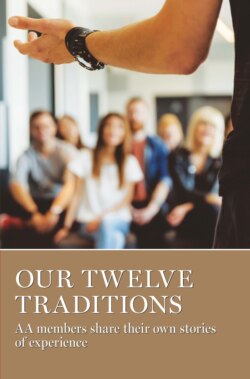Читать книгу Our Twelve Traditions - Группа авторов - Страница 17
На сайте Литреса книга снята с продажи.
Growing Pains
ОглавлениеJanuary 1998
The principle that “our common welfare comes first but that individual welfare follows close afterward,” as expressed in the long form of Tradition One, was brought home to me in my early sobriety.
The Kihei Morning Serenity group (KMS) on Maui began in 1982 with a Friday morning meeting at 7 A.M. Originally held in an elementary school, KMS soon moved to a small public library in a group of community buildings consisting of an open hall, a cafeteria, an office and a tiny church across the common.
When KMS moved to the library, we met around one table in a corner, penned in by books. In Maui’s young AA Fellowship, meetings of four or five people were very common and six or eight chairs usually sufficed, with a couple more available from the librarian’s office if the meeting overflowed. In just a few months, however, an influx of newcomers and a few folks who had moved to Maui, brought KMS a bigger crowd. Some mornings it was as many as 20 people. Seeing a need, we expanded to Mondays as well. Eventually we had people sitting on the sills of the open windows and on the floor between the stacks on both days.
Soon, some long-timers joined with the new arrivals in calling for a change of meeting halls to accommodate the growing throng. A couple of enterprising members spoke with the pastor of the church across the common about the use of the hall behind the church. There was some concern on the congregation’s part about overuse since meetings already met there on Monday, Tuesday, and Thursday evenings. However, they decided that renting their facilities to twelve-step groups was part of their mission, and they voted to allow us use of the hall.
When this information was brought before the group at the next home group meeting, a “loving debate” ensued. The group’s conscience was finally put to a vote and everyone was in favor of moving—everyone, that is, except one lone holdout, an original member of the group. We asked him to voice his minority view, and while his reasons for staying put—he didn’t think bigger was always better and he like the ambience of the library—didn’t sway the group, he was very adamant about not moving. He said that if the group moved, he would no longer attend.
Well, this really threw the group into a dither. Some felt it was emotional blackmail, while others calmly asked, “How important is this move right now, anyway?” and still more reminded us, “We should never be in a hurry in AA.” A second group conscience was taken and we voted to remain where we were until next month’s home group meeting.
The next month’s home group meeting was a repetition of the first. We all voted to move except the holdout who again said that if we moved, he would no longer attend. We still had the dilemma of people hanging from the windows and stacked up like cordwood in the aisles of the library, but the group once again voted in favor of the individual member and decided not to move for another month.
The third monthly home group meeting arrived and once again the move was the major topic. Once again the group voted to move the meeting. But—surprise!—the opposing member didn’t raise his hand against the motion. The group wanted to know if this member would still attend the meeting when it moved. The member said he didn’t know if he would attend but he could see there was a definite need to move and he no longer objected to the group conscience.
So, after three months, we felt we had sufficient unity to make the move and we did so promptly; the former opposing member did attend meetings in the new hall. Over the years, KMS has grown in size, and now 60 to a 100 members meet Monday through Saturday.
So, I learned firsthand that each AA member is a small part of a whole, and though every individual is important, he or she is not more important than the common welfare of the group.
D. E.
Wailuku, Hawaii
